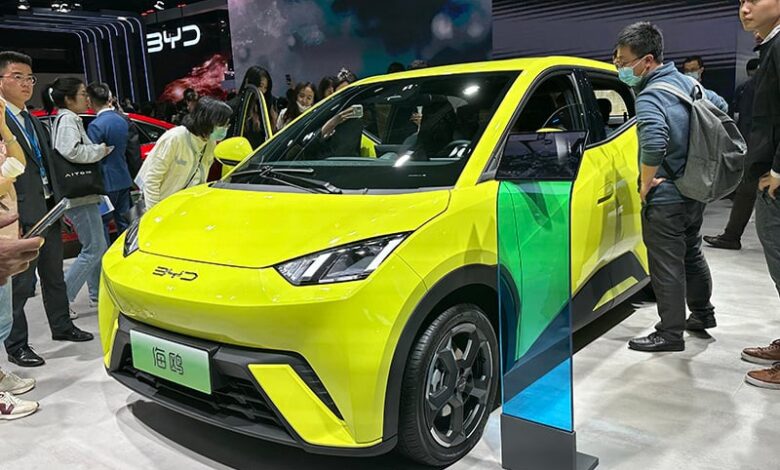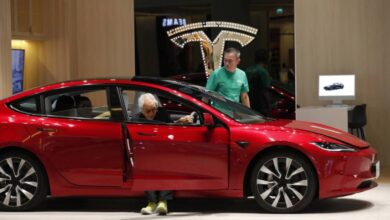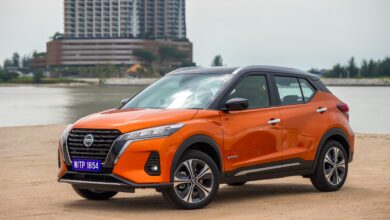US$12bil selloff casts shadow on BYD’s growth outlook

[ad_1]
SHANGHAI: Doubts over BYD Co’s sales targets and smart-car capabilities drove a US$12 billion selloff in the Chinese electric-vehicle maker last month, even as it draws closer to Tesla Inc as the industry’s top seller.
Hong Kong-listed BYD plunged 12% in November while Tesla and local rival XPeng Inc gained more than 15% each. BYD’s loss was fuelled by concerns over its ability to meet sales targets amid a difficult macro outlook, and the impact of price cuts to stave off tough competition.
There are also questions over whether BYD’s cars can compete with the intelligent, connected offerings from rivals. These are coming not only from established EV players but also new entrants including smartphone titan Huawei Technologies Co.
“The growth profile of BYD is being questioned,” and the company could wind up losing market share, said Xiadong Bao, a fund manager at Edmond de Rothschild Asset Management.
“The arrival of Huawei in the EV segment, will definitely shorten the time-to-market” for new Chinese products, and BYD is “more vulnerable” given its lagging tech.
BYD shares had actually outperformed in October as record sales pushed it closer to overtaking Tesla in deliveries of pure EVs. The market quickly turned bearish again, however, as the company increased discounts in an effort to continue driving sales.
With other headwinds including a selldown by longtime backer Warren Buffett’s Berkshire Hathaway Inc. and a European Union anti-subsidies probe into Chinese EVs, BYD shares have severely lagged most peers.
Some are betting on further losses, with short interest rising to over 4% of the free float over the last three weeks, according to IHS Markit data.
The stock’s weakness has helped drive the forward earnings multiple down to its lowest in about 12 years, which could be attractive to bargain hunters.
That valuation is “undemanding,” but it “depends heavily” on strong results estimates, which are now in question, said Edmond de Rothschild’s Bao. Growth has declined over the past three quarters and consensus expects a further slowdown over the next two periods.
While BYD’s sales reached another record last month, they were basically flat with the level in October. That might not help placate investors who have been questioning BYD’s sales goals for three million units this year and four million in 2024.
Peaking retail sales is a major reason reason for investor caution, along with price cuts, rising inventories and increasing competition, according to UOB Kay Hian Holdings Ltd, the only broker with a sell rating on the company.
Founded in 1995 with a focus on batteries, BYD is strong in power technologies, and has always stressed the safety of its products.
Smaller, younger peers like XPeng and Li Auto Inc, in contrast, have put resources into software development and sexy smart features, meaning BYD is now finding it necessary to increase investment to catch up.
BYD remains the dominant auto brand in China, having overtaken Volkswagen AG for the top sales spot this year. Its lineup of affordable electric and hybrid vehicles at dozens more price points than its emerging peers give it broad appeal.
Still, investors see mounting challenges. Huawei has already made a big splash in EVs, with strong orders for models that feature its advanced driver assistance system and other tech. The company is also building a large network of smart-car partners in the auto manufacturing and tech fields.
“The emerging alliance led by Huawei, the unrivaled leader in intelligent connected vehicle and autonomous driving technologies in China, will constitute a formidable threat to the established incumbent BYD,” UOB Kay Hian analysts including Ken Lee and Bella Lu wrote in a note.
Meanwhile the Chinese government has been increasing support for autonomous driving, toward levels where cars can essentially drive themselves. Morgan Stanley recommends shares of Li Auto, XPeng and Nio Inc., saying they will benefit from the market’s growing adoption of so-called navigation-on-autopilot technology.
“BYD will need to refresh its model lineup or have more competitive model launches given the challenging sector competition into 2024,” analysts including Tim Hsiao and Shelley Wang wrote in a note.
The company also faces the risk that an ongoing price war with Tesla “may keep consumers from purchasing as they continue to expect ever cheaper cars.”






